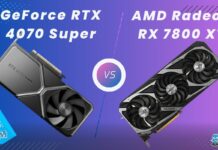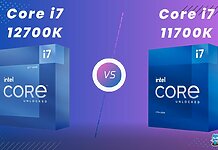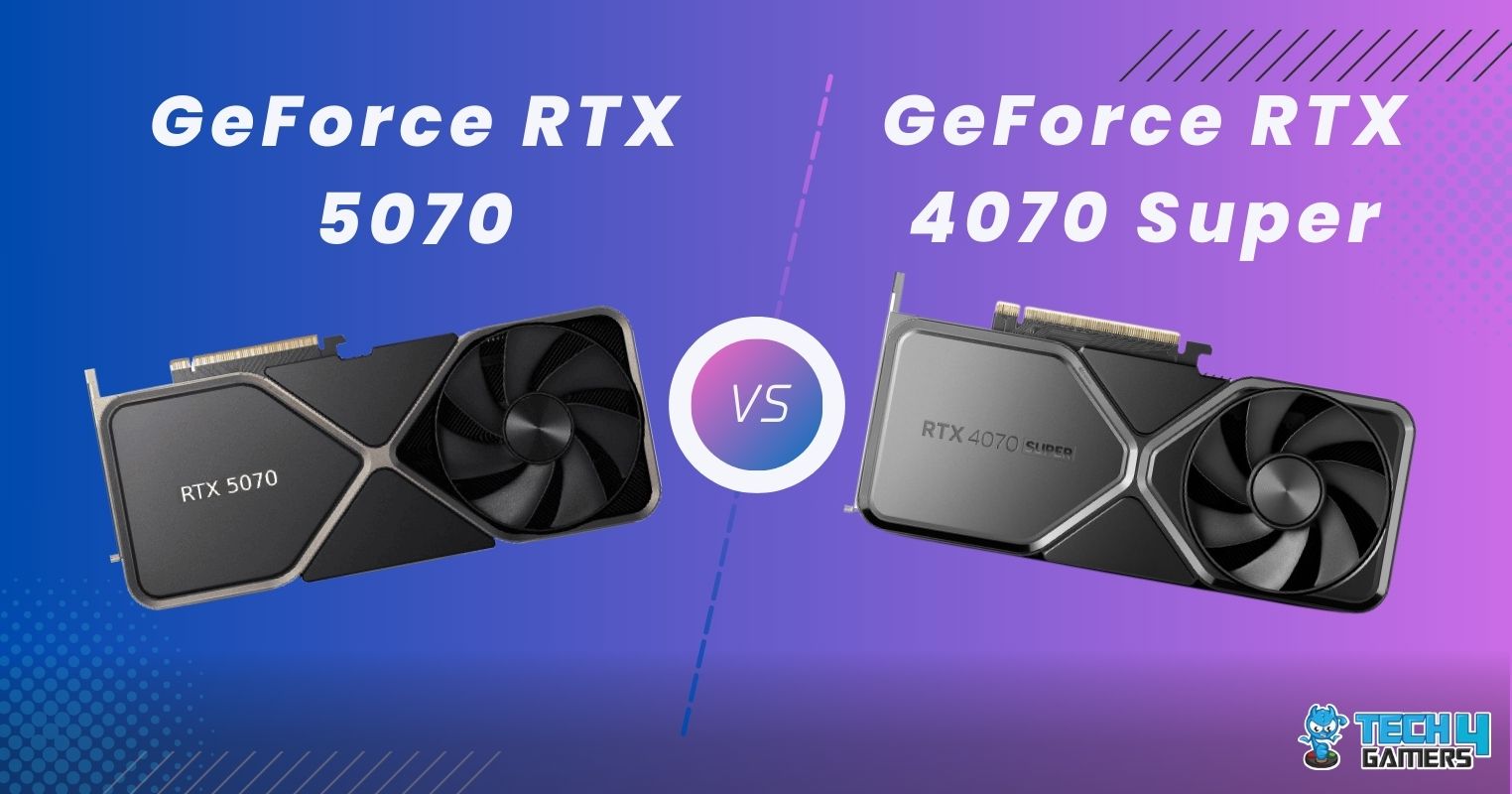Intel Core i7 1365U
Rated: 7/10
AMD Ryzen 7 7730U
Rated: 9/10
Pros And Cons
| CPU | Pros | Cons |
|---|---|---|
| Core i7 1365U | ✅ DDR5 support ✅ PCIe 4.0 support | ❌ Unimpressive value ❌ Mediocre Performance |
| Ryzen 7 7730U | ✅ Great performance ✅ Much cheaper | ❌ No DDR5 support ❌ Weaker iGPU |
- Starting with the processing nodes, the Core i7-1365U uses Intel’s 10nm node, while the Ryzen 7 7730U uses TSMC’s 7nm node. The two nodes are roughly equal in transistor density.
- We also observed that the Ryzen 7 7730U performed about 5.6% faster in multi-core applications and roughly 4% faster in our single-core applications than the Core i7-1365U.
- Additionally, the Ryzen 7 7730U provides much better value as the laptops using this mobile CPU are much cheaper.
Core i7-1365U Vs Ryzen 7 7730U – Comparison Table
| Mobile CPU | Core i7-1365U | Ryzen 7 7730U |
|---|---|---|
| Architecture | Hybrid Core Architecture | Zen 3 |
| Codename | Raptor Lake | Raphael |
| Socket | BGA-1744 | FP6 |
| L1 Cache | 80KB per core | 64KB per core |
| L2 Cache | 1280KB per core | 512KB per core |
| L3 Cache | 12MB | 16MB |
| Overclocking Support | No | No |
| Integrated Graphics | Intel Iris Xe Graphics (96 EUs) | Radeon Graphics (2 EUs) |
| PCIe Revision | 4.0 | 3.0 |
| Max Operating Temperature | 100°C | 95°C |
| Price Range | $1459 to $2742.55 | $699 to $1409 |
| Launch Date | January 3rd, 2023 | January 5th, 2023 |
Architectural Differences
- Process Nodes: Starting, the Ryzen 7 7730U uses TSMC’s 7nm node, while the Raptor Lake i7-1365U uses the Intel 7 node. The Intel 7 is a 10nm manufacturing process, which is roughly equal to TSMC’s 7nm process in transistor density.
- Core/Thread Counts: The Core i7-1365U houses 10 cores, including 2 P-cores and 8 E-cores. The thread count is 12, as the E-cores don’t have hyperthreading. As for the AMD Ryzen 7 7730U, it has 8 full-power cores along with 16 threads.
- Clock Speeds: The Ryzen 7 7730U has a base frequency of 2.0GHz and the boost frequency goes up to 4.5GHz. The Core i7-1365U has a base frequency of 2.4GHz for the P-cores and 1.3GHz for the E-cores, while the boost frequencies shoot up to 5.2GHz and 3.9GHz, respectively.
- Memory Support: The difference in memory support here is that the Core i7-1365U supports DDR5 (up to 5200 MT/s). Furthermore, it supports LPDDR5 (up to 6400 MT/s) and the power-efficient LPDDR5x (up to 6400 MT/s).
- TDP: The base TDP of the Core i7-1365U is adjustable between 12 watts and 15 watts. In comparison, it is fixed at 15 watts for the Ryzen 7 7730U. Also, the Core i7-1365U has a boost TDP of 55 watts, while the Ryzen 7 7730U does not have such a rating. But obviously, the Ryzen 7 7730U also draws more than 15 watts at turbo frequency.
In the market for a high-end yet power-efficient laptop? If so, you’ll likely come across Intel’s Core i7-1365U and AMD’s Ryzen 7 7730U CPUs. Today, I’m comparing the Core i7-1365U vs Ryzen 7 7730U to determine the better laptop CPU for you.
Performance Benchmarks
It’s time to talk performance. We’ll compare the multi-core and single-core scores of both CPUs in three applications. Let’s dive in.
Cinebench R23

- Starting with Cinebench R23, the Core i7-1365U scores 9418 points in our multi-core tests. The Ryzen 7 7730U bettered that with 10262 points. The difference is 8.9% according to our benchmarks.
- On to the single-core scores, the Core i7-1365U is the better CPU with 1756 points over 1436 scored by its AMD competitor. The Core i7-1365U’s lead is 22.2%.
Geekbench 5
- In Geekbench 5, we noted that the Core i7-1365U is easily the better CPU as it racks up 9218 multi-core points. The Ryzen 7 7730U falls behind by 24.3%, with 7410 points.
- As for the single-core scores, the Core i7-1365U managed 1709 points compared to 1456 points of the Ryzen 7 7730U.
Geekbench 6
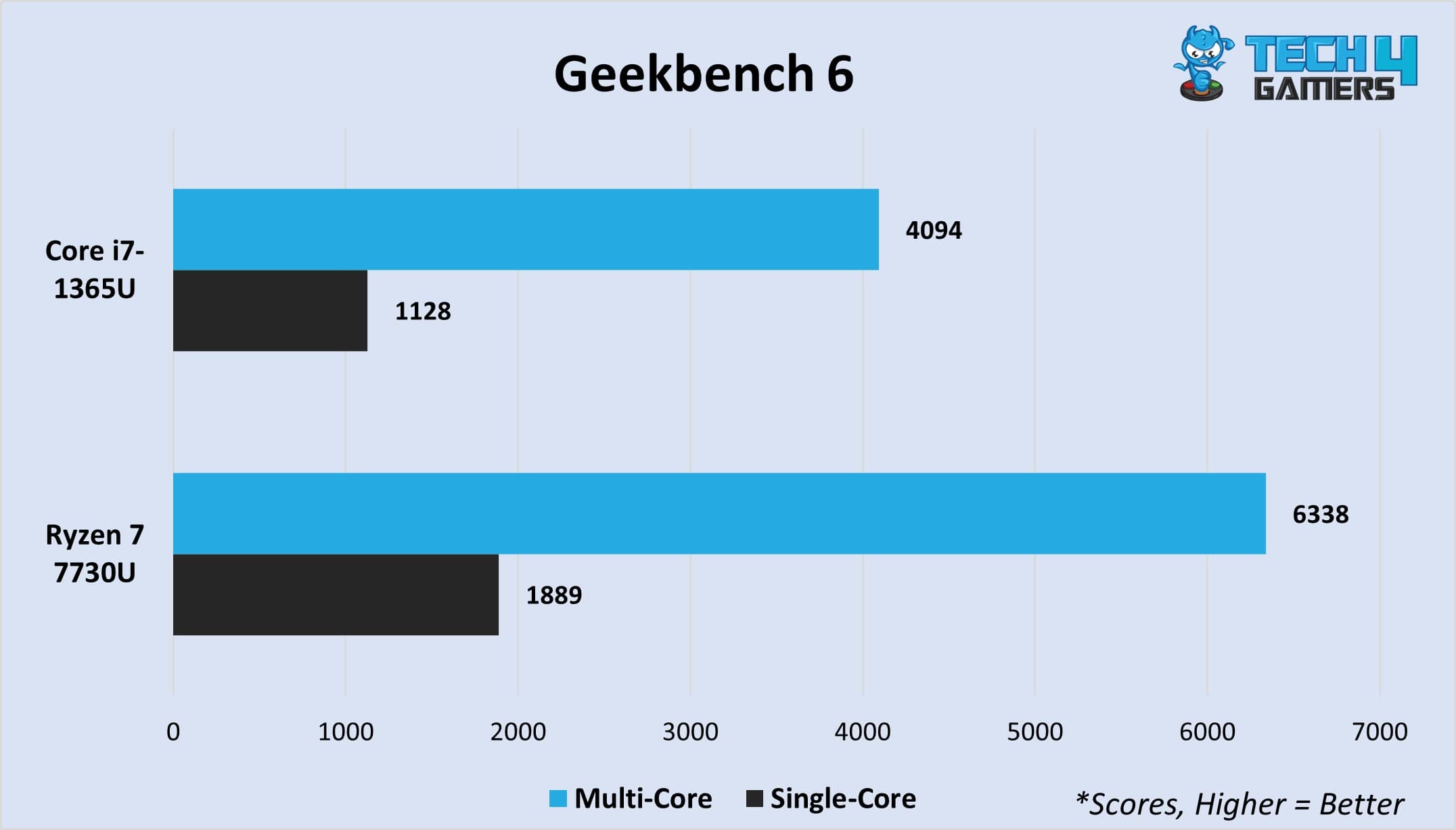
- In the multi-core Geekbench 6 test, the Ryzen 7 7730U scored significantly higher (6338 points) than the Core i7-1365U (4094 points). The difference here is 54.8%.
- The Ryzen 7 7730U also scored much higher in the single-core test with 1889 points in contrast to 1128 points of the Core i7-1365U. Here, the AMD CPU has a 67.4% lead.
Overall Performances
Let’s sum up the multi-core and single-core performance results. For this purpose, I’ve averaged the scores across the three applications.
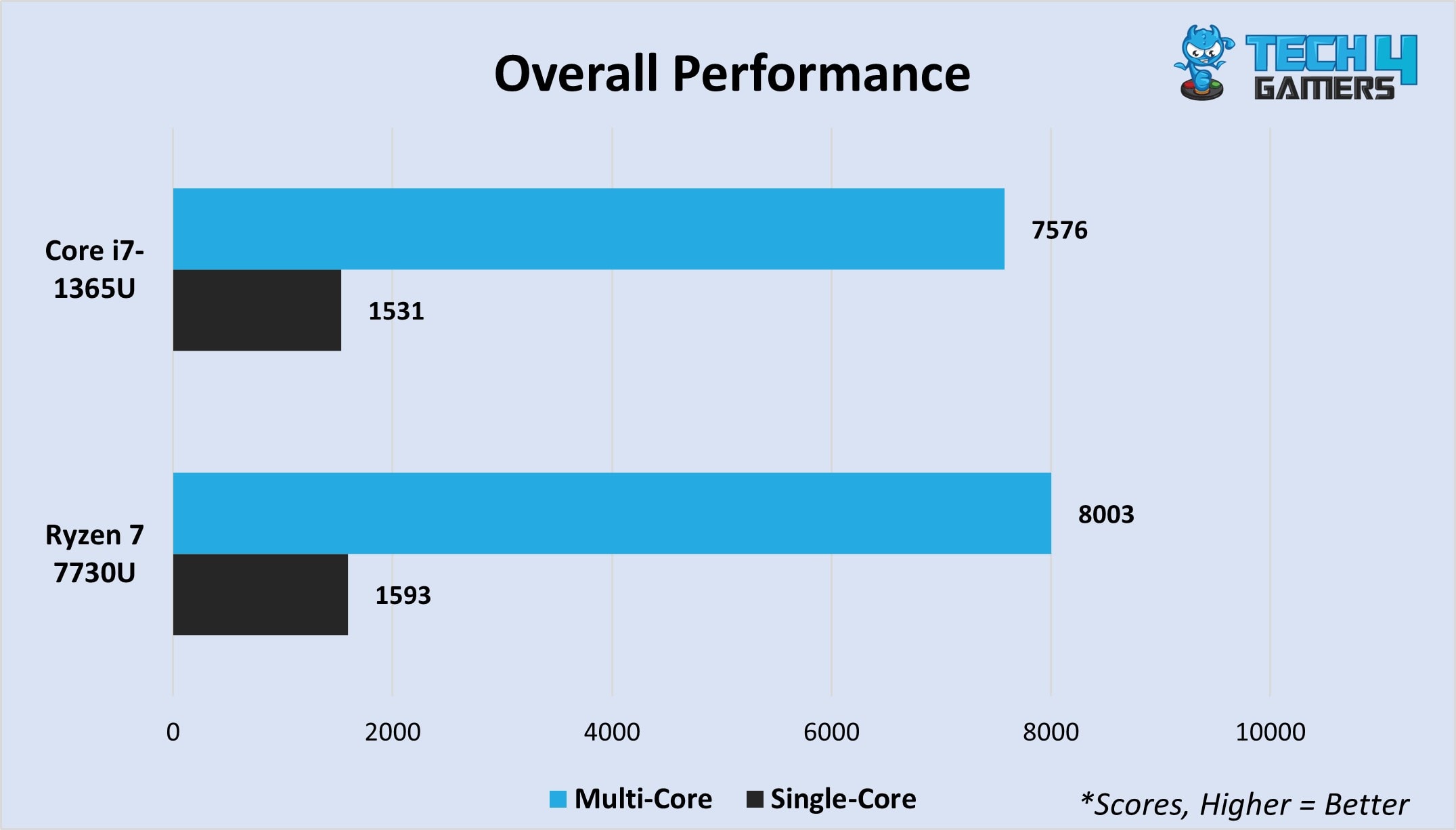
- Multi-core Performance: The Core i7-1365U scored 7576 points in total, while the Ryzen 7 7730U racked up 8003 points. Thus, on average, the Ryzen 7 7730U is 5.6% faster in multi-core applications than the Core i7-1365U.
- Single-core Performance: The two CPUs are head-to-head as the Core i7-1365U scored 1531 points while the Ryzen 7 7730U averaged 1593 points. Still, the Ryzen 7 7730U is the better CPU by 4%.
Laptop Prices
Next, let’s talk about prices.
| Graphics Card | MSRP | Current Price |
|---|---|---|
| Core i7-1365U | 💲1459 | 💲2742.55 |
| Ryzen 7 7730U | 💲699 | 💲1409 |
| Price Difference | 52.09% | 48.62% |
- Core i7-1365U: The Core i7-1365U laptops start at $1459, while the most popular options are in the $1700 to $2300 price bracket. Furthermore, the most premium options go up to $2742.55.
- Ryzen 7 7730U: Laptops utilizing this CPU are much cheaper, with entry-level options at just $699. The majority of the options are available between $700 and $1169, though. The laptops may cost as much as $1409.
Core i7-1365U Vs Ryzen 7 7730U – Which One To Choose?
AMD Ryzen 7 7730U: We observed that the Ryzen 7 7730U performs better in multi-core and single-core applications compared to its Intel counterpart. Additionally, laptops equipped with this AMD CPU are notably more affordable. In our opinion, the Ryzen 7 7730U undoubtedly offers much better value.
Intel Core i7 1365U: The Intel i7 1365U is a lesser performer and provides mediocre results as compared to the Ryzen 7 7730U. We saw that it is also far more heftier than the Ryzen 7 7730U. The lower prices of the Ryzen 7 7730U come at a cost, though, as it lacks support for the latest I/O: PCIe 4.0 and DDR5 support.
We recommend you go with the Ryzen 7 7730U if you don’t deem the features of PCIe 4.0 and DDR5 memory support as important as other factors. However, if you are willing to spend a significant amount of money to avail these options, you should stick with the Core i7-1365U as it is ideal under these conditions.
More From Ryzen 7 7730U:
Thank you! Please share your positive feedback. 🔋
How could we improve this post? Please Help us. 😔
[Comparisons Expert]
Abdemanaf is a skilled creative writer who has been honing his craft since 2011. While initially working in different fields, he found a passion for technology and has been exploring the tech world since early 2015. Over the years, he has developed an in-depth knowledge of the latest tech trends and product offerings by various companies.
Abdemanaf’s writing reflects his analytical mindset and ability to think critically. He has a knack for breaking down complex technical information into easily digestible pieces, making his articles engaging and accessible to readers from all backgrounds. In February 2022, he joined Tech4Gamers as a blog and product comparison writer, where he has been able to hone his skills further.
As a writer, Abdemanaf is dedicated to staying up-to-date with the latest technological advancements and trends, enabling him to provide readers with the most relevant and accurate information. He is always eager to learn more and is constantly seeking new challenges to improve his skills.
Get In Touch: manaf@tech4gamers.com


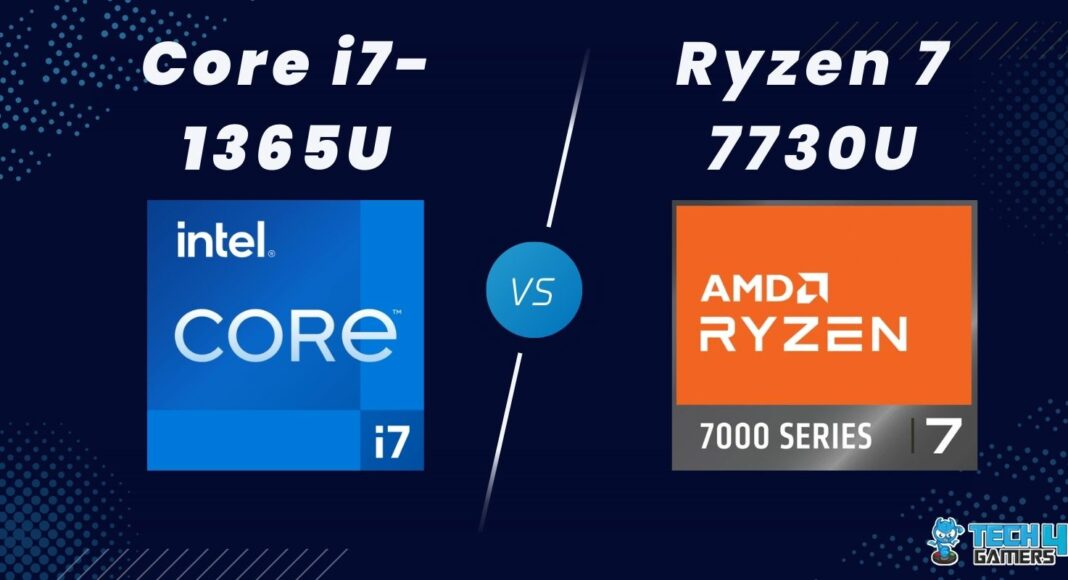
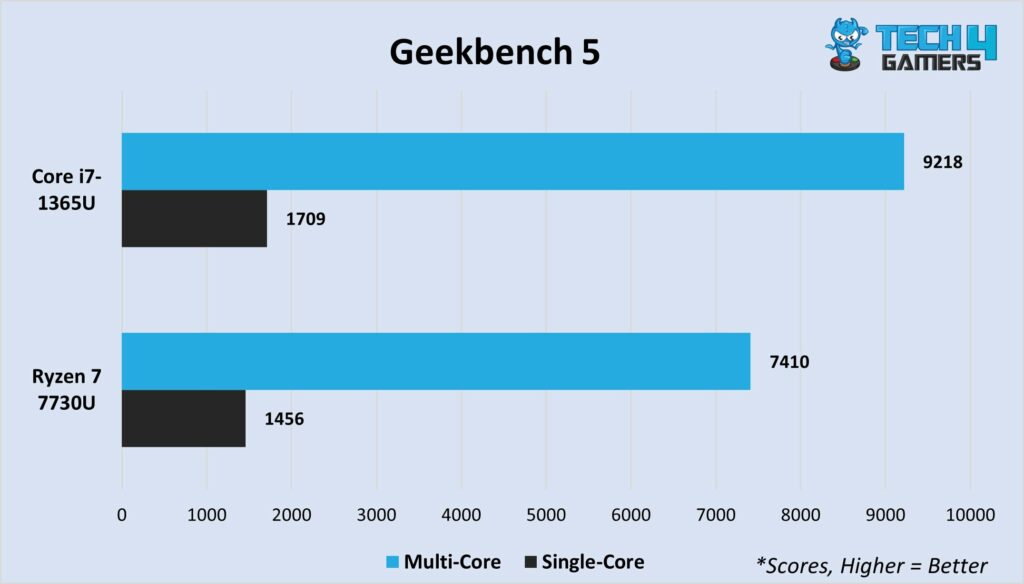
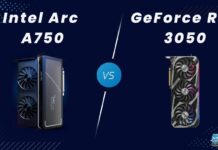
![Core i5-13500 Vs Ryzen 5 7600 [We Tested 8 Games]](https://tech4gamers.com/wp-content/uploads/2023/05/CPU-Comparison-Template-NEW-218x150.jpg)
